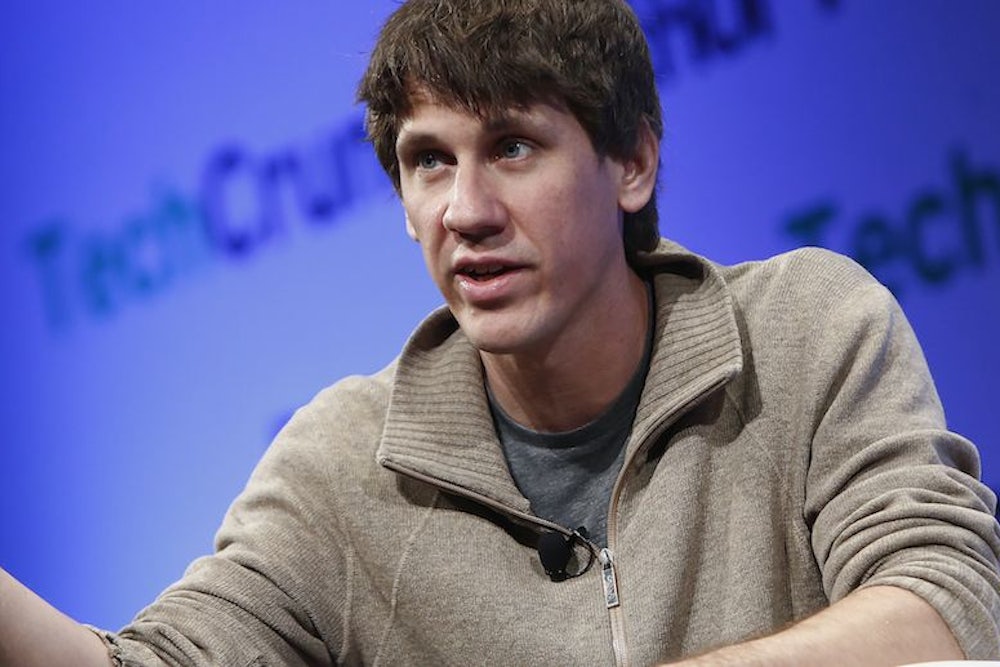It's been a rough few months for Foursquare. The four-year-old location-sharing app, best known for making you the "mayor" of a place if you "check in" there more than anyone else, generated only $2 million in revenue in 2012; a research firm pronounced in January it would be dead or purchased by the end of the year. In March, the 150-person company took on $41 million in debt to keep itself alive a little longer. Prognostications have gone from skeptical to downright apocalyptic.
Yesterday, Foursquare CEO Dennis Crowley took to the stage at TechCrunch Disrupt, a New York City tech conference, to quiet the haters. In response to a question about the negative press, Crowley proclaimed that the critics don't know what they’re talking about.
"I think we're not the shiny new thing anymore. We're a company that's been around for four years," said the shaggy-haired founder. "I also think we're in that hazing period for companies where people are still skeptical of whether this company can pull it off, or not. We saw Facebook go through this, we see Twitter go through this. We're that company that quietly pushes out big enhancements to everything we do. I think people get caught up in the story, and not necessarily the things we're actually doing."
It's true that a cloud of pessimism tends to feed on itself (see: Apple lately). And Crowley does have some decent numbers to push back with: According to him, a million people download the app every month, and now 60 percent of users live outside the U.S. The company has rolled out all sorts of tools for small businesses to use Foursquare to bring more people through the door—and it's finally charging the businesses for them.
It's just not clear anybody realizes these changes.
"A lot of it's just underutilized. We have APIs for a lot of the merchant tools, and I don't think people have really cracked those open yet," Crowley said. "I think there's a lot of people who still think of us as the 2009 Foursquare, like check-ins and badges. And there's still that kind of stuff in the app. The biggest haters and the biggest critics of Foursquare are the same people that haven't opened the app in six months. There's a lot of people that haven't realized how much it's changed recently, and I think that applies to consumers too."
Startups often have to switch up huge components of their business models in order to actually monetize them. But in changing public perception, Crowley's got a bigger problem on his hands. While he was building a better Foursquare, the app’s essential innovation—broadcasting your location, to alert you to friends nearby—got baked into thousands of new apps, not to mention Facebook, Google, and Twitter. Every app that asks if it can use your physical location (known as geolocation) is collecting information about where you are, and often selling it to local merchants, many of which want to send you special-offer notifications when you pass by their business. Another set of apps, like Grindr, exist solely to put you in touch with the people around you, creating a kind of geographic omniscience with almost no effort. Somewhat unexpectedly, the age of the smartphone has made place more important, not less; geolocation data is now too valuable not to have.
Foursquare thinks it can take advantage of this new normal. Crowley talks about "building a location layer for the Internet," doing for geography what Facebook did for the social graph, by integrating with apps like Instagram and Thrillist to create an even richer and more searchable trove of social-media and recommendation data. But Yelp might have the edge on them, having built up a community of people who've spent years writing reviews on local establishments, and planning to create more partnerships with the industries it covers, like coordinating reservations for restaurants or making doctor appointments. At this point, Foursquare can almost become as good as it wants, and not regain its dominance in the category of "I am here." It's the peril of becoming one thing in the consumer imagination, and then, when competitors catch up, not being able to convince consumers that you’ve become something bigger.
Crowley seems to recognize that hurdle.
"There's all this value that you can tease out of Foursquare," he said. "But in order to do it, you have to take your phone out of your pocket and continue using Foursquare and ask Foursquare a question."
